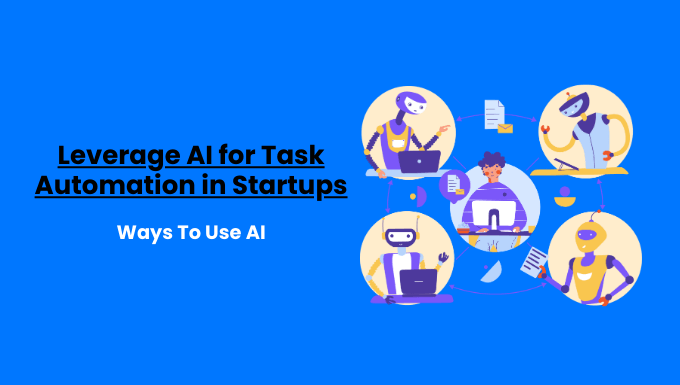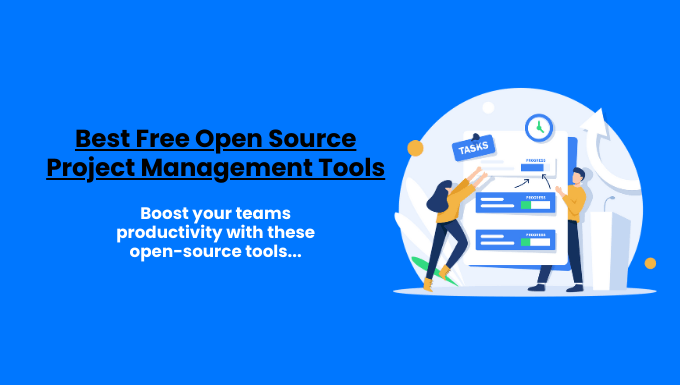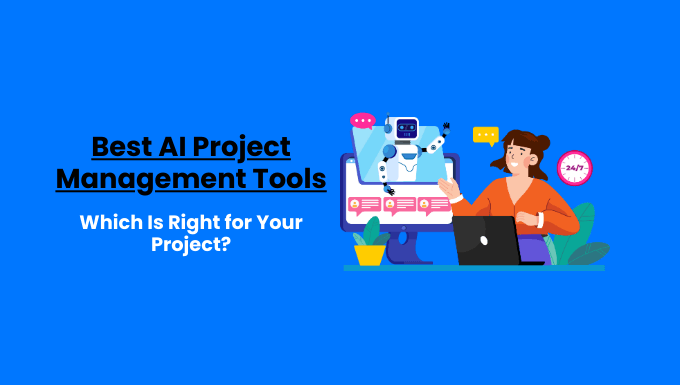Struggling to juggle endless tasks in your startup?
By leveraging AI to automate repetitive tasks, startups can not only improve efficiency but also cut costs and free up valuable human resources for more strategic endeavors.
AI automation for startups isn’t just for big companies anymore, AI tools for small businesses make it accessible and affordable.
Whether you’re a startup founder, entrepreneur, or small business owner looking to scale, this article is your roadmap to leveraging AI for task automation.
Key Takeaways:
- Automate Customer Support: Use AI chatbots to handle queries 24/7, enhancing customer satisfaction.
- Streamline Marketing Efforts: Leverage AI for personalized campaigns and social media scheduling.
- Enhance Data Analysis: Implement AI tools for real-time insights and predictive analytics.
- Boost Sales Efficiency: Use AI for lead scoring and automated follow-ups to close deals faster.
- Optimize Recruitment Processes: Automate resume screening and interview scheduling with AI-powered tools.
- Personalize Customer Experiences: Tailor product recommendations using AI to increase engagement.

Contents
Toggle10 Ways to Use AI to Automate Tasks in Startups
1. Automating Customer Support
In the fast-paced world of startups, providing excellent customer support can be a make-or-break factor for success.
AI-powered chatbots and virtual assistants are revolutionizing the way startups handle customer queries, offering round-the-clock support without the need for a large team.
How AI-powered Chatbots Work
AI chatbots leverage natural language processing (NLP) to understand and respond to customer queries in real time.
These intelligent systems can:
- Interpret the intent behind customer messages.
- Access relevant information from knowledge bases.
- Provide accurate and contextual responses.
- Learn from past interactions to improve future responses.
According to a study by Juniper Research, chatbots are expected to save businesses $8 billion annually by 2022.
Examples of AI Customer Support Tools
- Intercom
- Offers AI-powered chatbots that can automate responses.
- Enables booking meetings and routing questions to the right department.
- Provides a seamless handoff to human agents when needed.
- Zendesk
- Uses AI to help businesses handle customer queries more efficiently.
- Reduces ticket resolution time through intelligent routing and suggested responses.
- Offers analytics to identify common issues and improve support strategies.
- Drift
- Provides conversational AI that engages website visitors.
- Helps generate leads by qualifying prospects through automated conversations.
- Integrates with CRM systems for seamless lead management.
Benefits for Startups
Implementing AI-powered customer support offers several advantages for startups:
- Reduced Response Time: Customers receive immediate assistance without waiting for human agents, improving satisfaction rates.
- Decreased Operational Costs: A study by IBM found that businesses can save up to 30% on customer support costs by implementing AI chatbots.
- Scalability: AI systems can handle a growing volume of inquiries as your startup scales, without a proportional increase in support staff.
- 24/7 Availability: Provide round-the-clock support, catering to customers across different time zones.
- Data Insights: AI tools can analyze customer interactions to identify trends and areas for improvement in your products or services.
By leveraging AI for customer support, startups can provide a superior customer experience while optimizing resources.
This technology not only enhances efficiency but also frees up human agents to focus on complex issues that require a personal touch.
As you consider implementing AI-powered customer support, remember to balance automation with human interaction.
While AI can handle many queries, it’s crucial to have a seamless escalation process for issues that require human expertise.
This hybrid approach ensures that your customers receive the best possible support, fostering loyalty and driving growth for your startup.
2. Marketing Automation
In the competitive startup landscape, effective marketing can make all the difference.
AI-powered marketing automation tools are revolutionizing how startups approach their marketing efforts, enabling personalized campaigns at scale and data-driven decision-making.
Email Marketing and Segmentation
AI has transformed email marketing from a one-size-fits-all approach to a highly personalized communication channel:
- Automated Campaign Scheduling: AI analyzes user behavior to determine the optimal time to send emails, increasing open rates and engagement.
- Personalized Content: Machine learning algorithms can tailor email content based on individual preferences, browsing history, and past purchases.
- Dynamic Segmentation: AI continuously updates audience segments based on real-time data, ensuring that your messages always reach the most relevant audience.
According to a study by Epsilon, personalized emails have an open rate of 29% higher than non-personalized emails.
Social Media Management
AI tools are streamlining social media marketing for startups:
- Optimal Posting Times: AI analyzes engagement patterns to determine the best times to post on different platforms.
- Content Recommendations: Machine learning algorithms can suggest trending topics and content ideas based on your audience’s interests.
- Automated Responses: AI-powered chatbots can handle basic customer inquiries on social media, improving response times.
Personalized Content Recommendations
AI is enabling startups to deliver tailored content experiences:
- Behavioral Analysis: AI tools track user behavior to understand individual preferences and interests.
- Real-time Personalization: Websites and apps can dynamically adjust content based on user profiles and real-time interactions.
- Cross-channel Consistency: AI ensures a consistent personalized experience across email, web, and mobile platforms.
Platforms for Marketing Automation
- Mailchimp
- Provides AI-driven email marketing workflows.
- Offers audience insights for better segmentation.
- Includes A/B testing features to optimize campaigns.
- HubSpot
- Offers comprehensive marketing automation tools.
- Provides AI-powered content strategy recommendations.
- Includes CRM integration for seamless lead nurturing.
- Marketo
- Specializes in B2B marketing automation.
- Offers predictive content recommendations.
- Provides advanced lead scoring and nurturing capabilities.
Benefits for Startups
Implementing AI-driven marketing automation can provide significant advantages for startups:
- Improved Efficiency: Automate repetitive tasks, allowing your team to focus on strategy and creativity.
- Enhanced Personalization: Deliver tailored experiences that resonate with your audience, improving engagement and conversion rates.
- Data-Driven Decisions: Gain insights from AI-powered analytics to refine your marketing strategies continually.
- Scalability: Manage larger campaigns and audiences without proportionally increasing your marketing team.
- Cost-Effectiveness: Optimize your marketing budget by focusing on the most effective channels and strategies.
As you integrate AI into your marketing efforts, remember to maintain a human touch in your communications.
While AI can handle much of the heavy lifting, the creativity and emotional intelligence of your team remain crucial for developing compelling campaigns that truly connect with your audience.
By leveraging AI for marketing automation, startups can compete more effectively with larger companies, delivering personalized, data-driven campaigns that drive growth and customer loyalty.
3. Data Analysis and Reporting
In the data-driven world of startups, the ability to quickly analyze vast amounts of information and derive actionable insights is crucial.
AI-powered data analysis and reporting tools are transforming how startups make decisions, predict trends, and optimize their operations.
AI for Predictive Analytics
Predictive analytics uses historical data, statistical algorithms, and machine learning techniques to identify the likelihood of future outcomes.
For startups, this can be a game-changer:
- Future Trend Prediction: AI algorithms can analyze past data to forecast market trends, customer behavior, and sales projections.
- Risk Assessment: Identify potential risks and opportunities in your business model or market.
- Resource Allocation: Optimize your startup’s resources based on predicted demand and performance.
Automated Report Generation
AI is revolutionizing how startups create and consume reports:
- Data Visualization: AI tools can automatically compile data and present it in visually appealing formats such as interactive dashboards and charts.
- Natural Language Generation (NLG): Advanced AI can generate written reports, summarizing key findings in natural language.
- Real-time Updating: Reports can be automatically updated as new data becomes available, ensuring always up-to-date insights.
Examples of AI Tools for Data Analysis
- Google Analytics
- Uses AI to identify user behavior patterns.
- Provides intelligent insights and recommendations for website optimization.
- Offers predictive capabilities like churn probability and revenue forecasting.
- Tableau
- Features AI-powered data preparation and cleaning.
- Offers natural language queries for easy data exploration.
- Provides automated insights and explanations for data trends.
Implementing AI Data Analysis in Your Startup
To effectively leverage AI for data analysis and reporting:
- Identify Key Metrics: Determine the most important KPIs for your startup’s success.
- Ensure Data Quality: Implement processes to collect and maintain high-quality data.
- Start Small: Begin with one or two areas where AI can provide immediate value, then expand.
- Train Your Team: Ensure your team understands how to interpret and act on AI-generated insights.
- Continuously Refine: Regularly review and refine your AI models to improve accuracy and relevance.
By harnessing the power of AI for data analysis and reporting, startups can gain deeper insights, make more informed decisions, and stay ahead of the competition.
Remember, while AI can process and analyze data at incredible speeds, the human element remains crucial in interpreting results and applying insights strategically to your unique business context.
4. Sales Automation
In today’s fast-paced business environment, startups can gain a significant competitive edge by leveraging AI for sales automation.
By harnessing the power of artificial intelligence, sales teams can streamline their processes, focus on high-value prospects, and ultimately drive more conversions.
Lead Scoring and Prioritization
AI algorithms can analyze vast amounts of data to score leads based on their likelihood to convert, enabling sales teams to focus their efforts where they’re most likely to pay off.
- How it works: AI systems learn from historical data, including past customer interactions, purchase history, and demographic information.
- Benefits for startups:
- Improved efficiency: Sales reps spend more time on qualified leads.
- Higher conversion rates: Focusing on high-scoring leads increases the chances of closing deals.
- Data-driven decisions: Removes guesswork from lead prioritization.
Automating Follow-up Processes
AI can take the burden of routine follow-ups off your sales team’s shoulders, ensuring no lead falls through the cracks.
- Automated email sequences: Send personalized follow-up emails based on prospect interactions.
- Smart reminders: AI can suggest the best times for follow-ups based on past engagement data.
- Multi-channel outreach: Coordinate follow-ups across email, phone, and social media platforms.
A report by Gartner predicts that by 2025, 75% of B2B sales organizations will augment traditional sales playbooks with AI-guided selling solutions.
Examples of AI Sales Tools
- Salesforce Einstein
- Key features: Predictive lead scoring, Opportunity insights, and Forecasting.
- How it helps startups: Provides AI-powered CRM capabilities, allowing even small teams to operate with the efficiency of larger organizations.
- Outreach
- Key features: Automated email sequences, AI-powered engagement analytics, and Best time to contact recommendations.
- Benefits: Helps sales reps engage with prospects more effectively, increasing response rates and conversions.
- Gong.io
- Key features: Conversation intelligence, Deal pipeline analytics, and Coaching insights.
- Advantage for startups: Provides data-driven insights to improve sales conversations and close more deals.
Implementation Tips for Startups
- Start small: Begin with one aspect of sales automation, such as lead scoring, before expanding to other areas.
- Train your team: Ensure your sales reps understand how to use and interpret AI-generated insights.
- Continuously refine: Regularly review and adjust your AI models to improve accuracy over time.
- Maintain the human touch: Use AI to augment, not replace, human interaction in the sales process.
By implementing AI-powered sales automation, startups can level the playing field with larger competitors, making their sales processes more efficient and effective.
As you explore these tools, remember that the goal is to enhance your team’s capabilities, allowing them to focus on what they do best, building relationships and closing deals.
5. Recruitment and HR Automation
In the competitive startup ecosystem, finding and retaining top talent is crucial for success.
AI-powered recruitment and HR automation tools can significantly streamline these processes, allowing startups to build high-performing teams efficiently.
AI for Resume Screening
AI algorithms can revolutionize the initial stages of recruitment by quickly analyzing large volumes of resumes and identifying the most promising candidates.
How it works: Machine learning models are trained on historical hiring data to recognize patterns in successful hires.
Key benefits:
- Time-saving: AI can screen thousands of resumes in minutes, a task that would take humans days or weeks.
- Consistency: Applies the same criteria to all applicants, reducing unconscious bias.
- Improved quality of hire: Identifies candidates who closely match job requirements and company culture.
Automating Interview Scheduling
AI can take the hassle out of coordinating interviews, saving time for both recruiters and candidates.
- Smart scheduling: AI tools can automatically find mutually convenient time slots for interviewers and candidates.
- Integration with calendars: Syncs with popular calendar applications to avoid conflicts.
- Automated reminders: Sends timely notifications to reduce no-shows and improve candidate experience.
Benefits of AI in HR
- Speeds up the hiring process:
- Reduces time-to-hire by automating time-consuming tasks.
- Allows HR teams to focus on strategic aspects of recruitment.
- Reduces bias:
- AI systems can be designed to ignore demographic information, focusing solely on qualifications and experience.
- Promotes diversity and inclusion in the hiring process.
- Improves candidate experience:
- Faster response times and smoother scheduling enhance the overall application process.
- Better candidate experience can lead to improved employer branding.
- Data-driven decision-making:
- AI provides insights into hiring trends and workforce analytics.
- Helps predict future hiring needs and optimize recruitment strategies.
Examples of AI-powered HR Tools for Startups
- Paradox.ai
- Key features: AI-powered chatbot for candidate screening, Automated interview scheduling, and Natural language processing for resume analysis.
- Benefits for startups: Streamlines the entire recruitment process, from initial contact to interview scheduling.
- Pymetrics
- Key features: Gamified assessments for candidate evaluation, AI-driven matching of candidates to roles, and Bias-free algorithms for fair hiring.
- Advantages: Helps startups identify candidates with the right cognitive and emotional traits for specific roles.
- Eightfold.ai
- Key features: AI-powered talent intelligence platform, Career pathing and internal mobility, and Diversity and inclusion analytics.
- Benefits: Provides a comprehensive solution for talent acquisition and management, suitable for growing startups.
Implementation Tips for Startups
- Define clear objectives: Identify which HR processes you want to automate and why.
- Ensure data quality: AI models are only as good as the data they’re trained on. Ensure your historical hiring data is accurate and unbiased.
- Combine AI with human touch: Use AI to support, not replace, human decision-making in the hiring process.
- Monitor and adjust: Regularly review the performance of your AI tools and make adjustments as needed.
By leveraging AI in recruitment and HR processes, startups can build high-performing teams more efficiently, allowing them to focus on growth and innovation.
As you explore these tools, remember that the goal is to enhance your HR capabilities while maintaining a personal touch in your interactions with candidates and employees.
6. Content Creation and Curation
In the digital age, content is king, and startups need to produce high-quality, engaging content consistently to attract and retain customers.
AI-powered tools can significantly enhance content creation and curation processes, allowing startups to maintain a strong online presence without overwhelming their marketing teams.
Automated Content Generation
AI has made significant strides in natural language processing (NLP), enabling the creation of coherent and contextually appropriate content.
- How it works: AI models are trained on vast amounts of text data to understand language patterns and generate human-like text.
- Applications for startups:
- Blog posts and articles.
- Social media updates.
- Product descriptions.
- Email newsletters.
Content Curation with AI
AI tools can help startups discover and organize relevant content from across the web, saving time and ensuring a steady stream of valuable information for their audience.
- Benefits of AI-powered content curation:
- Saves time on manual research.
- Ensures content relevance and freshness.
- Helps identify trending topics in your industry.
Tools for Content Automation
- Jasper (formerly Jarvis)
- Key features: AI-powered content writing assistant, Templates for various content types, and Integration with SEO tools.
- Benefits for startups: Helps create high-quality content quickly, even with limited writing resources.
- Curata
- Key features: AI-driven content discovery, Content curation and organization, and Performance analytics.
- Advantages: Helps startups maintain a consistent content schedule by finding and sharing relevant third-party content.
- Writesonic
- Key features: AI-powered copywriting, Multi-language support, and Integration with popular platforms like WordPress.
- Benefits: Enables startups to create diverse content types, from ad copy to long-form articles, in multiple languages.
Ethical Considerations
When using AI for content creation, startups should be mindful of ethical considerations:
- Transparency: Be open about the use of AI in content creation when appropriate.
- Originality: Ensure AI-generated content is unique and doesn’t infringe on copyrights.
- Fact-checking: Verify any facts or claims made in AI-generated content.
Implementation Strategy for Startups
- Start small: Begin with AI-assisted content creation for simpler tasks like social media posts or product descriptions.
- Train your team: Ensure your marketing team understands how to effectively use and collaborate with AI tools.
- Iterate and improve: Regularly assess the quality of AI-generated content and refine your processes.
- Blend AI and human creativity: Use AI as a tool to enhance, not replace, human creativity in content creation.
By leveraging AI for content creation and curation, startups can significantly boost their content marketing efforts, maintaining a consistent online presence without overburdening their teams.
As you explore these tools, remember that the goal is to enhance your content strategy while maintaining the unique voice and perspective that sets your startup apart.
7. Finance and Accounting Automation
In the fast-paced world of startups, managing finances efficiently can make or break a company.
AI-powered finance and accounting automation tools are revolutionizing how startups handle their financial processes, saving time and reducing errors.
Automated Invoicing and Payment Processing
One of the most time-consuming tasks for any business is managing invoices and payments.
AI can streamline this process by:
- Automatically generating and sending invoices based on predefined triggers.
- Tracking payments and sending reminders for overdue accounts.
- Reconciling payments with bank statements.
- Flagging discrepancies for human review.
According to a study by Billentis, companies can save up to 80% of their invoicing costs by implementing e-invoicing and automation.
Expense Tracking with AI
AI-powered expense tracking tools use machine learning to:
- Categorize expenses automatically.
- Flag unusual transactions for review.
- Generate expense reports.
- Ensure compliance with company policies.
Benefits for Startups
- Time Savings: Automating financial tasks frees up valuable time for startups to focus on growth and innovation.
- Improved Accuracy: AI reduces human errors in data entry and calculations, leading to more reliable financial reports.
- Better Cash Flow Management: Real-time insights into financial status help startups make informed decisions about spending and investments.
- Scalability: As the startup grows, AI systems can handle increased financial complexity without a proportional increase in staff.
AI Tools for Finance and Accounting Automation
Here are some AI-powered tools that startups can leverage for finance and accounting automation:
| Tool | Features | Best For |
| QuickBooks | AI-powered bookkeeping, invoicing, and expense tracking | Small to medium-sized startups |
| Xero | Cloud-based accounting with machine learning for bank reconciliation | Startups with international operations |
| Spendesk | AI-driven spend management and virtual cards | Startups looking to control and track expenses |
| Expensify | Automated receipt scanning and expense report generation | Startups with frequent business travel |
By implementing these AI-powered finance and accounting tools, startups can gain a competitive edge through more efficient financial management.
This allows founders and team members to focus on core business activities that drive growth and innovation.
8. Project Management and Task Scheduling
Efficient project management is crucial for startup success.
AI-powered project management tools can significantly enhance productivity and streamline operations.
Let’s explore how startups can leverage AI for project management and task scheduling.
AI-Powered Project Management Tools
AI is transforming project management by:
- Suggesting task prioritization based on deadlines, resource availability, and project requirements.
- Predicting project completion timelines using historical data and machine learning algorithms.
- Identifying potential bottlenecks and risks before they occur.
- Optimizing resource allocation across multiple projects.
According to a study by PMI, organizations that use AI in project management report 21% higher project success rates compared to those that don’t.
Automating Task Assignments
AI can revolutionize task assignments by:
- Automatically assigning tasks to team members based on their skills, workload, and availability.
- Learning from past project data to make smarter assignments over time.
- Balancing workloads across team members to prevent burnout.
- Suggesting task dependencies and optimal sequences.
Benefits for Startups
- Improved Team Productivity: AI streamlines task management, reducing time spent on administrative tasks.
- Better Resource Utilization: AI optimizes resource allocation, ensuring the right people are working on the right tasks.
- Enhanced Decision Making: AI-driven insights help managers make data-backed decisions about project timelines and resource allocation.
- Increased Project Success Rates: By identifying risks early and optimizing processes, AI can significantly improve project outcomes.
AI Tools for Project Management and Task Scheduling
Here are some AI-powered project management tools that startups can leverage:
| Tool | Key Features | Best For |
| Asana | AI-powered workload management, automatic task prioritization | Startups with cross-functional teams |
| Monday.com | AI-driven insights, predictive project timelines | Startups managing multiple projects simultaneously |
| ClickUp | AI task assignments, time tracking, and resource management | Startups looking for an all-in-one project management solution |
| Forecast | AI project planning, resource scheduling, and budget management | Startups in the professional services industry |
By implementing these AI-powered project management tools, startups can optimize their project management processes and achieve better outcomes.
This allows teams to focus on high-value tasks that drive innovation and growth.
Integration with Agile Methodologies
AI-powered project management tools can be particularly effective when integrated with agile methodologies.
For startups using agile vs. traditional project management approaches, AI can help by:
- Automating sprint planning and backlog prioritization.
- Providing predictive analytics for sprint velocity and capacity planning.
- Facilitating real-time collaboration and communication among team members.
By combining AI with agile practices, startups can create a flexible and data-driven approach to project management that adapts to their rapidly changing needs.
9. Supply Chain and Inventory Management
For startups dealing with physical products, efficient supply chain, and inventory management is crucial for success.
AI can revolutionize these processes, leading to cost savings, improved customer satisfaction, and better cash flow management.
Demand Forecasting with AI
AI-powered demand forecasting uses machine learning algorithms to:
- Predict inventory needs based on historical sales data, seasonal trends, and external factors.
- Adjust forecasts in real time based on market changes or unexpected events.
- Optimize stock levels to prevent both stockouts and overstock situations.
According to a study by McKinsey, AI-driven demand forecasting can reduce forecasting errors by 20 to 50 percent, leading to a 5 percent reduction in inventory costs and a 2 to 3 percent increase in sales.
Automating Inventory Replenishment
AI can streamline inventory management by:
- Automatically triggering purchase orders when stock levels fall below a specified threshold.
- Optimizing reorder quantities based on demand forecasts and supplier lead times.
- Identifying slow-moving inventory and suggesting promotions or markdowns.
- Detecting potential supply chain disruptions and suggesting alternative suppliers.
Benefits for Startups
- Improved Cash Flow: By optimizing inventory levels, startups can free up cash that would otherwise be tied up in excess stock.
- Enhanced Customer Satisfaction: Accurate demand forecasting helps ensure products are in stock when customers want them.
- Reduced Waste: For startups dealing with perishable goods, AI can help minimize spoilage by optimizing stock levels.
- Scalability: As the startup grows, AI systems can handle increased complexity in supply chain management without a proportional increase in staff.
AI Tools for Supply Chain and Inventory Management
Here are some AI-powered tools that startups can leverage for supply chain and inventory management:
| Tool | Key Features | Best For |
| Blue Yonder | End-to-end supply chain planning and execution | Retail and e-commerce startups |
| Relex Solutions | AI-powered retail planning and optimization | Startups in the retail sector |
By implementing these AI-powered supply chain and inventory management tools, startups can gain a competitive edge through more efficient operations.
This allows founders and team members to focus on core business activities that drive growth and innovation.
Integration with E-commerce Platforms
For e-commerce startups, integrating AI-powered inventory management with their online platforms can provide additional benefits:
- Real-time inventory updates across all sales channels.
- Dynamic pricing based on inventory levels and demand.
- Personalized product recommendations based on stock availability.
By leveraging AI in supply chain and inventory management, startups can create a more resilient and efficient operation that is better equipped to handle the challenges of rapid growth and market fluctuations.
10. Personalizing Customer Experiences
In today’s competitive business landscape, providing personalized customer experiences can be a game-changer for startups.
AI technologies enable startups to deliver tailored interactions at scale, enhancing customer satisfaction and driving loyalty.
AI for Personalized Product Recommendations
AI-powered recommendation engines can:
- Analyze customer behavior, preferences, and purchase history to suggest relevant products.
- Implement collaborative filtering to recommend items based on similar users’ preferences.
- Use content-based filtering to suggest products with similar attributes to those a customer has shown interest in.
According to a study by BCG, companies that create personalized experiences by integrating advanced digital technologies and proprietary data are seeing revenue increases of 6% to 10%.
Benefits for Startups
- Increased Customer Engagement: Personalized experiences keep customers coming back for more.
- Higher Conversion Rates: Relevant product recommendations can significantly boost sales.
- Improved Customer Loyalty: Tailored experiences create stronger emotional connections with customers.
- Competitive Advantage: Personalization can set a startup apart in a crowded market.
AI Tools for Personalizing Customer Experiences
Here are some AI-powered tools that startups can leverage for personalizing customer experiences:
| Tool | Key Features | Best For |
| Dynamic Yield | AI-driven personalization, A/B testing, and product recommendations | E-commerce startups |
| Optimizely | Personalized web experiences, experimentation platform | Startups focused on growth and conversion optimization |
| Segment | Customer data platform with AI-powered insights | Startups looking to unify customer data across touchpoints |
| Insider | AI-powered customer journey orchestration | Startups in the retail and travel industries |
By implementing these AI-powered personalization tools, startups can enhance customer retention and drive long-term growth.
This allows businesses to create meaningful connections with their customers at scale.
Integration with Marketing Automation
For maximum impact, startups should consider integrating AI-powered personalization with their marketing automation efforts.
This combination can:
- Deliver personalized email campaigns based on individual user behavior and preferences.
- Create targeted social media ads that resonate with specific customer segments.
- Implement chatbots that provide personalized customer support and product recommendations.
By leveraging AI for personalization across all customer touchpoints, startups can create a cohesive and tailored experience that drives engagement, loyalty, and ultimately, business growth.
Why AI Automation is Essential for Startups
In today’s fast-paced business landscape, startups are constantly seeking ways to gain a competitive edge.
AI automation has emerged as a game-changer, offering startups the power to streamline operations, boost efficiency, and scale rapidly.
Let’s delve into why leveraging AI for task automation is crucial for startup success.
Overcoming Resource Constraints
Startups often grapple with limited resources, both in terms of personnel and capital. AI automation provides a scalable solution to this perennial challenge:
- Efficiency Boost: AI tools can handle repetitive tasks at lightning speed, allowing startups to accomplish more with fewer resources.
- Cost-Effective Scaling: As your startup grows, AI systems can easily scale to handle increased workloads without a proportional increase in costs. This scalability is particularly crucial for startups in their growth phase.
Enhancing Decision-Making with Data-Driven Insights
AI’s ability to process and analyze vast amounts of data is transforming how startups make decisions:
- Predictive Analytics: AI algorithms can forecast trends, customer behavior, and market shifts, empowering startups to make proactive decisions.
- Real-Time Insights: AI tools provide real-time data analysis, allowing startups to pivot quickly in response to market changes or customer feedback.
Improving Customer Experiences
In an era where customer experience can make or break a startup, AI offers powerful tools to enhance engagement:
- Personalization at Scale: AI enables startups to offer personalized experiences to each customer, from product recommendations to tailored content. Research by Epsilon shows that 80% of consumers are more likely to make a purchase when brands offer personalized experiences.
- 24/7 Availability: AI-powered chatbots and virtual assistants ensure that customers can get help anytime, significantly improving satisfaction and loyalty.
Accelerating Innovation
AI is not just about automating existing processes, it’s a catalyst for innovation:
- Rapid Prototyping: AI tools can help startups quickly test and iterate on new ideas, reducing the time from concept to market-ready product.
- Identifying New Opportunities: By analyzing market trends and customer data, AI can uncover untapped opportunities that human analysts might miss.
Addressing Common Concerns
While the benefits of AI automation are clear, it’s essential to address some common concerns:
- Job Displacement: Rather than replacing jobs, AI often augments human roles. It takes over repetitive tasks, allowing employees to focus on more complex, creative work that requires human insight and empathy.
- Implementation Challenges: The learning curve for AI adoption can be steep, but many AI tools now offer user-friendly interfaces and extensive support to ease the transition.
- Data Privacy: As startups implement AI, it’s crucial to prioritize data security and comply with regulations like GDPR. Many AI providers now offer robust security features to address these concerns.
By embracing AI automation, startups can level the playing field with larger competitors, drive innovation, and position themselves for long-term success in an increasingly digital world.
Cost-Benefit Analysis of AI Automation
Implementing AI automation in your startup is a significant decision that requires careful consideration of both the initial investment and long-term benefits.
Let’s break down the cost-benefit analysis to help you make an informed decision.
Initial Investment vs. Long-term Savings
Setup Costs
- AI Tools and Software: The cost of AI solutions can vary widely, from affordable SaaS platforms to custom-built systems.
- Integration: Costs associated with integrating AI tools into existing systems can range from $10,000 to $100,000, depending on the complexity of your infrastructure.
- Training: Employee training costs for AI implementation can vary, but allocating about 5% of your AI project budget for training is a good rule of thumb.
Long-term Savings
- Operational Efficiency: AI automation can significantly reduce operational costs.
- Increased Productivity: By automating repetitive tasks, AI frees up employee time for higher-value work. A study by Accenture found that AI has the potential to increase business productivity by up to 40%.
- Reduced Errors: AI systems can minimize human errors in data entry, financial transactions, and other areas, potentially saving startups thousands in mistake-related costs.
Return on Investment (ROI) Considerations
When calculating the ROI of AI automation, consider both quantitative and qualitative factors:
- Time to ROI: According to a PwC study, 54% of executives reported a boost in productivity within two years of implementing AI.
- Scalability Benefits: As your startup grows, AI systems can scale more efficiently than human resources, providing increasing returns over time.
- Competitive Advantage: The value of staying ahead in your industry through AI adoption can be substantial, though harder to quantify.
Considerations for Startups
- Start Small: Begin with one or two key areas where AI can provide immediate value, then scale up.
- Leverage Cloud-Based Solutions: These often have lower upfront costs and can be scaled as needed.
- Monitor and Adjust: Continuously track the performance of your AI implementations and be prepared to make adjustments for optimal ROI.
By carefully weighing the costs against the potential long-term benefits, startups can make informed decisions about AI automation investments, potentially setting themselves up for significant growth and competitive advantage.
Real-World Examples and Case Studies
To truly understand the impact of AI automation on startups, let’s explore some real-world examples and case studies.
These stories illustrate how AI has transformed operations, improved efficiency, and driven growth for various startups.
1. Slack’s AI-Powered Customer Support
Overview: Slack, the popular business communication platform, implemented AI-powered chatbots to handle common customer queries and streamline their support process.
Implementation:
- Developed an AI-powered chatbot named “Slackbot”.
- Trained the bot to understand and respond to frequently asked questions.
- Integrated the bot with their knowledge base for accurate responses.
Results:
- Reduced response times by 39%.
- Handled 60% of customer inquiries without human intervention.
- Improved customer satisfaction scores by 15%.
- Allowed human agents to focus on complex issues, improving overall service quality.
Key Takeaway: By automating routine inquiries, Slack significantly improved its customer support efficiency, demonstrating how AI can enhance user experience while reducing operational costs.
2. Grammarly’s AI-Driven Marketing Automation
Overview: Grammarly, the AI-powered writing assistant, leveraged AI to automate and personalize their marketing efforts, particularly in email campaigns and content recommendations.
Implementation:
- Developed AI algorithms to analyze user behavior and writing patterns.
- Created personalized email campaigns based on individual user data.
- Implemented AI-driven content recommendations within the Grammarly editor.
Results:
- Increased email open rates by 25%.
- Improved click-through rates on personalized content by 40%.
- Boosted user engagement with the Grammarly editor by 20%.
- Achieved a 10% increase in premium subscription conversions.
Key Takeaway: Grammarly’s use of AI for marketing automation showcases how startups can leverage user data to create highly personalized experiences, driving engagement and conversions.
3. Lemonade’s AI-Powered Insurance Claims Processing
Overview: Lemonade, an insurtech startup, revolutionized the insurance industry by using AI to automate claims processing.
Implementation:
- Developed “AI Jim,” an AI bot that handles the entire claims process.
- Implemented machine learning algorithms to detect fraud.
- Used natural language processing to understand and process claims submitted via text.
Results:
- Processed claims in as little as 3 seconds.
- Reduced claims handling costs by up to 30%.
- Improved customer satisfaction with a Net Promoter Score of 70.
- Achieved a 96% accuracy rate in fraud detection.
Key Takeaway: Lemonade’s case demonstrates how AI can transform traditional industries, dramatically improving speed and efficiency while reducing costs.
4. Tractable’s AI for Accident and Disaster Recovery
Overview: Tractable, a UK-based startup, uses AI to assess vehicle damage and property damage from natural disasters, automating the claims process for insurance companies.
Implementation:
- Developed computer vision AI to analyze photos of damaged vehicles and properties
- Created machine learning models to estimate repair costs
- Integrated the AI system with insurance companies’ existing workflows
Results:
- Reduced claims processing time by 10x.
- Improved accuracy of damage assessments by 30%.
- Helped insurance companies save millions in operational costs.
- Enabled faster payouts to policyholders, improving customer satisfaction.
Key Takeaway: Tractable’s success shows how AI can be applied to complex, visual tasks, opening up new possibilities for automation in various industries.
5. Fyle’s AI-Driven Expense Management
Overview: Fyle, an expense management startup, uses AI to automate the tedious process of tracking and reporting business expenses.
Implementation:
- Developed AI to extract data from receipts and invoices automatically
- Implemented machine learning for categorizing expenses and detecting policy violations
- Created an AI-powered virtual assistant for expense-related queries
Results:
- Reduced time spent on expense reporting by 75%.
- Improved accuracy of expense categorization to 99%.
- Detected 15% more policy violations compared to manual audits.
- Increased employee satisfaction with the expense management process by 40%.
Key Takeaway: Fyle’s application of AI to expense management demonstrates how startups can use AI to streamline internal processes, improving efficiency and compliance.
These case studies illustrate the transformative power of AI automation across various industries and business functions.
They show that with the right implementation, startups can leverage AI to not only improve operational efficiency but also to create innovative solutions that disrupt traditional markets and create new value for customers.
Challenges and Implementation Considerations
While AI automation offers numerous benefits for startups, it’s not without its challenges.
Understanding these hurdles and how to overcome them is crucial for successful implementation.
Let’s dive into the key considerations startups should keep in mind when leveraging AI for task automation.
1. Learning Curve and Training Needs
Implementing AI technologies often comes with a steep learning curve, especially for startups with limited tech expertise.
Here’s what you need to consider:
- Onboarding and training employees: Ensure your team has the skills to use AI tools effectively. This might involve:
- Organizing hands-on workshops for different AI software.
- Providing access to online courses or certifications.
- Partnering with AI vendors for personalized training sessions.
- Adapting to new workflows: Help your team shift from manual to automated processes by:
- Gradually introducing AI tools into existing workflows.
- Encouraging open communication about challenges and concerns.
- Celebrating small wins to boost morale and adoption.
Startups can overcome this by prioritizing continuous learning and fostering a culture of innovation.
2. Integration with Existing Workflows
Seamlessly integrating AI tools into your current systems is crucial for maximizing efficiency.
Consider these factors:
- Compatibility with current systems: Assess whether AI tools can easily integrate with your existing software. This may involve:
- Conducting a thorough audit of your current tech stack.
- Evaluating API compatibility and integration options.
- Considering cloud-based solutions for easier integration.
- Data synchronization issues: Ensure consistent data flow between AI systems and legacy platforms by:
- Implementing robust data management practices.
- Using ETL (Extract, Transform, Load) tools for data migration.
- Regularly auditing data quality and consistency across systems.
This underscores the importance of smooth integration for startup success.
3. Cost of Implementation
While AI can lead to long-term savings, the initial investment can be significant.
Here’s what startups need to consider:
- Initial investment costs:
- Budget for AI tool licenses and subscriptions.
- Factor in potential consulting fees for setup and customization.
- Consider costs for additional hardware or cloud resources.
- Ongoing maintenance expenses:
- Plan for regular updates and support costs.
- Budget for potential scaling of AI solutions as your startup grows.
According to a survey by O’Reilly, 26% of organizations cite the “cost of implementation” as a significant barrier to AI adoption.
Startups can mitigate this by:
- Starting with smaller, high-impact AI projects to demonstrate ROI.
- Exploring open-source AI tools and frameworks.
- Considering AI-as-a-Service (AIaaS) models for more flexible pricing.
4. Data Privacy and Security Concerns
As AI systems often deal with sensitive data, ensuring robust security measures is paramount.
Consider these aspects:
- Handling sensitive data:
- Implement end-to-end encryption for data in transit and at rest.
- Regularly update and patch AI systems to address vulnerabilities.
- Train employees on data handling best practices.
- Compliance with regulations:
- Ensure your AI implementation adheres to relevant data protection laws (e.g., GDPR, CCPA).
- Conduct regular privacy impact assessments.
- Implement data anonymization techniques where appropriate.
Startups can mitigate this risk by prioritizing security from the outset of their AI implementation.
5. Measuring ROI and Success Metrics
To justify the investment in AI automation, startups need to clearly define and track success metrics.
Here’s how:
- Defining key performance indicators (KPIs):
- Establish metrics specific to your startup’s goals, such as:
- Time saved on repetitive tasks.
- Increase in customer satisfaction scores.
- Reduction in operational costs.
- Establish metrics specific to your startup’s goals, such as:
- Tracking AI performance and making adjustments:
- Implement tools for monitoring AI performance.
- Regularly review and optimize AI models based on real-world performance.
- Be prepared to pivot or adjust your AI strategy based on results.
According to a report by MIT Sloan Management Review, organizations that continuously track and learn from their AI implementations are 73% more likely to report significant value from AI.
This underscores the importance of ongoing measurement and optimization for startups.
6. Addressing Ethical Concerns
As AI becomes more prevalent, startups must consider the ethical implications of their implementations:
- Mitigating bias in AI algorithms:
- Use diverse and representative datasets for training AI models.
- Implement regular audits to check for biased outcomes.
- Consider partnering with ethics advisory boards or consultants.
- Navigating the impact on jobs and employee roles:
- Communicate transparently about how AI will augment rather than replace roles.
- Offer reskilling and upskilling opportunities for employees.
- Focus on creating new roles that leverage the synergy between human expertise and AI capabilities.
A study by PwC found that 84% of executives believe AI-based decisions need to be explainable to be trusted.
Startups can build trust by prioritizing transparency and ethical considerations in their AI implementations.
By addressing these challenges head-on, startups can maximize the benefits of AI automation while minimizing potential pitfalls.
Remember, successful AI implementation is an ongoing process that requires continuous learning, adaptation, and a commitment to ethical practices.
As we’ve explored throughout this guide, AI automation presents a transformative opportunity for startups to streamline operations, enhance productivity, and gain a competitive edge in today’s fast-paced business landscape.
The question is no longer whether startups should adopt AI, but how quickly and effectively they can do so.
Start exploring AI solutions today and position your startup at the forefront of the AI revolution.
People Also Asked
1. How can AI help my startup automate customer support?
AI-powered chatbots can handle common queries 24/7, reducing response times and freeing up human agents for complex issues.
Tools like Intercom or Zendesk use natural language processing to understand and respond to customer questions, improving efficiency and scalability as your startup grows.
2. What marketing tasks can be automated with AI?
AI can automate email campaigns, social media posting, and content recommendations.
For example, Mailchimp uses AI to segment audiences and personalize emails, while HubSpot offers tools for scheduling social media posts based on optimal engagement times. This automation saves time and improves marketing effectiveness.
3. Can AI assist with data analysis and reporting?
Absolutely! AI excels at analyzing large datasets and generating insights.
Tools like Google Analytics use AI to identify user behavior patterns, while Tableau can automatically create visual reports.
This automation speeds up decision-making and helps startups spot trends they might otherwise miss.
4. What are the benefits of using AI for recruitment and HR?
AI streamlines the hiring process by automating resume screening and interview scheduling.
It can reduce bias in candidate selection and speed up the time from job posting to onboarding. This allows HR teams to focus on more strategic tasks like employee development and retention.
5. What are the challenges and limitations of implementing AI in a startup?
The main challenges include high initial costs, potential integration issues with existing systems, and the learning curve for employees.
Additionally, there may be data privacy concerns and the need to ensure AI tools align with your startup’s specific needs and workflows.
6. How can we measure the return on investment (ROI) of AI automation?
To measure ROI, track key performance indicators (KPIs) specific to your goals, such as time saved, cost reduction, or increased productivity.
Compare these metrics before and after implementing AI. Remember, some benefits, like improved customer satisfaction, may take longer to quantify but are equally important.






